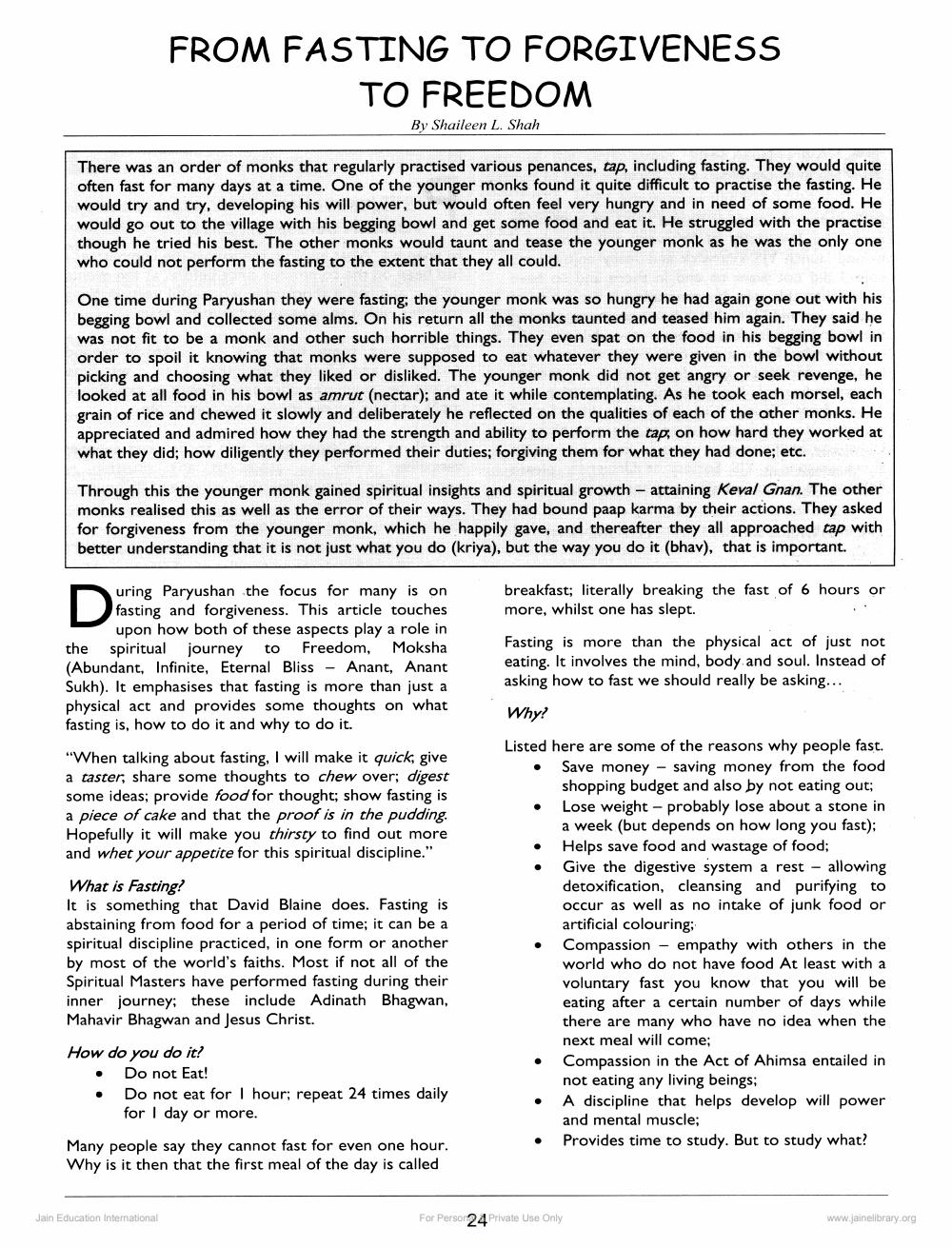________________
FROM FASTING TO FORGIVENESS
TO FREEDOM
By Shaileen L. Shah
There was an order of monks that regularly practised various penances, tap, including fasting. They would quite often fast for many days at a time. One of the younger monks found it quite difficult to practise the fasting. He would try and try, developing his will power, but would often feel very hungry and in need of some food. He would go out to the village with his begging bowl and get some food and eat it. He struggled with the practise though he tried his best. The other monks would taunt and tease the younger monk as he was the only one who could not perform the fasting to the extent that they all could.
One time during Paryushan they were fasting; the younger monk was so hungry he had again gone out with his begging bowl and collected some alms. On his return all the monks taunted and teased him again. They said he was not fit to be a monk and other such horrible things. They even spat on the food in his begging bowl in order to spoil it knowing that monks were supposed to eat whatever they were given in the bowl without picking and choosing what they liked or disliked. The younger monk did not get angry or seek revenge, he looked at all food in his bowl as amrut (nectar); and ate it while contemplating. As he took each morsel, each grain of rice and chewed it slowly and deliberately he reflected on the qualities of each of the ather monks. He appreciated and admired how they had the strength and ability to perform the tap, on how hard they worked at what they did; how diligently they performed their duties; forgiving them for what they had done; etc.
Through this the younger monk gained spiritual insights and spiritual growth - attaining Keval Gnan. The other monks realised this as well as the error of their ways. They had bound paap karma by their actions. They asked for forgiveness from the younger monk, which he happily gave, and thereafter they all approached tap with better understanding that it is not just what you do (kriya), but the way you do it (bhav), that is important.
breakfast; literally breaking the fast of 6 hours or more, whilst one has slept.
uring Paryushan the focus for many is on fasting and forgiveness. This article touches
upon how both of these aspects play a role in the spiritual journey to Freedom, Moksha (Abundant, Infinite, Eternal Bliss - Anant, Anant Sukh). It emphasises that fasting is more than just a physical act and provides some thoughts on what fasting is, how to do it and why to do it.
Fasting is more than the physical act of just not eating. It involves the mind, body and soul. Instead of asking how to fast we should really be asking...
Why?
"When talking about fasting, I will make it quick, give a taster, share some thoughts to chew over; digest some ideas, provide food for thought; show fasting is a piece of cake and that the proof is in the pudding. Hopefully it will make you thirsty to find out more and whet your appetite for this spiritual discipline."
What is Fasting? It is something that David Blaine does. Fasting is abstaining from food for a period of time; it can be a spiritual discipline practiced, in one form or another by most of the world's faiths. Most if not all of the Spiritual Masters have performed fasting during their inner journey; these include Adinath Bhagwan, Mahavir Bhagwan and Jesus Christ.
Listed here are some of the reasons why people fast. • Save money - saving money from the food
shopping budget and also by not eating out; Lose weight - probably lose about a stone in a week (but depends on how long you fast); Helps save food and wastage of food; Give the digestive system a rest - allowing detoxification, cleansing and purifying to occur as well as no intake of junk food or artificial colouring: Compassion - empathy with others in the world who do not have food At least with a voluntary fast you know that you will be eating after a certain number of days while there are many who have no idea when the next meal will come; Compassion in the Act of Ahimsa entailed in not eating any living beings; A discipline that helps develop will power and mental muscle; Provides time to study. But to study what?
How do you do it?
• Do not Eat! • Do not eat for 1 hour; repeat 24 times daily
for 1 day or more.
Many people say they cannot fast for even one hour. Why is it then that the first meal of the day is called
Jain Education International
For Persor 24 Private Use Only
www.jainelibrary.org




